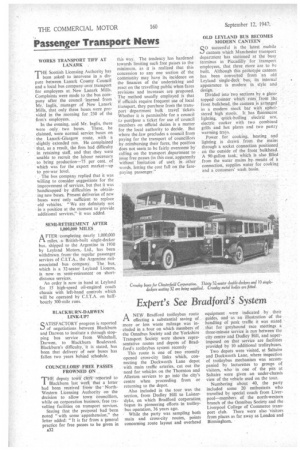Passenger Transport News
Page 34

If you've noticed an error in this article please click here to report it so we can fix it.
WORKS TRANSPORT TIFF AT LANARK .
THE Scottish Licensing Authority has been asked to intervene in a dispute between Lanark County Council and a local bus company over transport for employees at New Lanark ,Mills. Complaints were made to the bus company after the council • learned from Mr. Inglis, manager of New Lanark Mills, that only three buses were provided in the morning for 230 of the firm's employees.
In the evening, said Mr. Inglis, there were only two buses. These, he claimed, were normal service buses on the Lanark-Glasgow route, with • a slightly extended run. He complained that, as a result, the firm had difficulty , in retaining staff, and that they were unable to recruit the labour necessary to bring production-75 per cent, of which was for the export market—up to pre-war level.
, The bus company replied that it was willing to consider suggestions for the improvement of services, but that it was handicapped by difficulties in obtaining new buses. Present deliveries of new buses wereonly sufficient to replace ' old vehicles. "We are definitely not
• in a position at the moment to provide additional services," it was added.
SEMI-RETIREMENT AFTER 100,000 MILES
A FTER completing nearly 1,000,000 miles, a British-built single-decker bus, shipped to the Argentine in 1930 by Leyland Motors,. Ltd., has been withdrawn fromthe regular passenger services of C.I.T.A., the Argentine railassociated bus company. The bus, which is a 32-seater Leyland Lioness, is now in semi-retirement on shortdistance services.
An order is now in hand at Leyland for 15 high-speed oil-engined coach chassis with left-hand controls which will be operated by C.I.T.A. on half
hourly 300-mile runs. .
B L ACK BURN-DARWEN LINK-UP?
• SATISFACTORY progress is reported
of negotiations between Blackburn and Damen to institute a through stopping bus service from Whitehall, Darwen, to Blackburn Boulevard. Blackburn's difficulty, it is stated, has been that delivery of new buses has fallen two years behind schedule.
COUNCILLORS' FREE PASSES FROWNED ON THE deputy town clerk reported to Blackburn last week that a letter had been received from' the NorthWestern Licensing Authority on the decision to allow town councillors, while on corporation business, free travelling facilities on transport services. Stating that the proposal had been noted "with some apprehension," the letter added: "It is far from a general practice for free passes to be given in A32
this way. The tendency has hardened towards limiting such free passes to the minimum, as it is realized that this concession to any one section of the community may have its incidence on the finances of the undertaking and react on the travelling public when fares revisions and increases are proposed. The method usually employed is that if officials require frequent use of local transport, they purchase from the transport department bulk traveltickets Whether it is permissible for a council ta purctiase a ticket for use of council members on official duties is a matter for the local authority to decide. But where the law precludes a council from paying for the transport of councillors by reimbursing their fares, the position does not seem to be fairly overcome by' calling on the transport department to issue free passes (in this case, apparently without limitation of use); in other words, letting the cost fall on the farepaying passenger."
OLD LEYLAND BUS BECOMES MODERN CANTEEN
SO successful is the latest mobile canteen which Manchester transport department has stationed at the busy terminus in Piccadilly for transport employees, that three More are to be built, Although this prototype canteen has been converted from an old Leyland single-deck bus, its internal appearance is modern in style and design.
Divided into two sections by a glasstopped counter which runs from the front bulkhead, the canteen is arranged as a modern snack bar with upholstered high stools. It has 'fluorescent lighting, quick-boiling electric urn, electric cooker with two combined grills and hot plates and two pastry warming trays.
Power for cooking, heating and lighting is drawn from the mains through a socket connection positioned on the outside of the front bulkhead. A 90-gallon tank, which is also filled from the water mains by means of a connection, supplies water for cooking and a customers' wash basin.




















































































